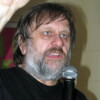Slavoj Zizek

Slavoj Zizek
Slavoj Žižek; born 21 March 1949) is a Slovenian psychoanalytic philosopher, cultural critic, and Hegelian Marxist. He is a senior researcher at the Institute for Sociology and Philosophy at the University of Ljubljana, Global Distinguished Professor of German at New York University, and international director of the Birkbeck Institute for the Humanities of the University of London. His work is located at the intersection of a range of subjects, including continental philosophy, political theory, cultural studies, psychoanalysis, film criticism, and...
ProfessionPhilosopher
Date of Birth21 March 1949
I believe in clear-cut positions. I think that the most arrogant position is this apparent, multidisciplinary modesty of "what I am saying now is not unconditional, it is just a hypothesis," and so on. It really is a most arrogant position. I think that the only way to be honest and expose yourself to criticism is to state clearly and dogmatically where you are. You must take the risk and have a position.
A spectre is haunting Western academia (...), the spectre of the Cartesian subject.
Confucius was not so much a philsopher as a proto-ideologist: what interested him was not metaphysical Truths but rather a harmonious social order within which individuals could lead happy and ethical lives. He was the first to outline clearly what one is tempted to call the elementary scene of ideology, its zero-level, which consists in asserting the (nameless) authority of some substantial Tradition.
I secretly think reality exists so we can speculate about it.
The fact that a cloud from a minor volcanic eruption in Iceland—a small disturbance in the complex mechanism of life on the Earth—can bring to a standstill the aerial traffic over an entire continent is a reminder of how, with all its power to transform nature, humankind remains just another species on the planet Earth.
Word is murder of a thing, not only in the elementary sense of implying its absence - by naming a thing, we treat it as absent, as dead, although it is still present - but above all in the sense of its radical dissection: the word 'quarters' the thing, it tears it out of the embedment in its concrete context, it treats its component parts as entities with an autonomous existence: we speak about color, form, shape, etc., as if they possessed self-sufficient being.
There is a contradiction between market liberalism and political liberalism. The market liberals (e.g., social conservatives) of today want family values, less government, and maintain the traditions of society (at least in America's case). However, we must face the cultural contradiction of capitalism: the progress of capitalism, which necessitates a consumer culture, undermines the values which render capitalism possible
In Stalinism the tragedy is that its origin is some kind of radical emancipatory project. In the origins you had a kind of workers' uprising; the true enigma is how this project of emancipation went so wrong.
[T]aking the Third into account does not bring us into the position of pragmatic consideration, of comparing different Others; the task is rather to learn to distinguish between false conflicts and the true conflict. For example, today's conflict between Western liberalism and religious fundamentalism is a false one, since it is based on the exclusion of the third term which is its truth: the Leftist emancipatory position.
The true ethical test is not only the readiness to save the victims, but also - even more, perhaps - the ruthless dedication to annihilating those who made them victims.
The minimum necessary structuring ingredient of every ideology is to distance itself from another ideology, to denounce its other as ideology.
You could say, in a vulgar Freudian way, that I am the unhappy child who escapes into books. Even as a child, I was most happy being alone. This has not changed.
I planted some jokes in my wedding. Like, the organizers asked me to select music. So when I approached wife at the ceremony, they played the second movement from Shostakovich's 10th Symphony, which is usually known as the "portrait of Stalin." And then when we embraced, the music that they played was Schubert's "Death and the Maiden." I enjoyed this in a childish way! But marriage was all a nightmare and so on and so on.
Global capitalism is simply accepted as a fact that you cannot do anything about. The only question is, Will you accommodate yourself to it, or will you be dismissed and excluded?